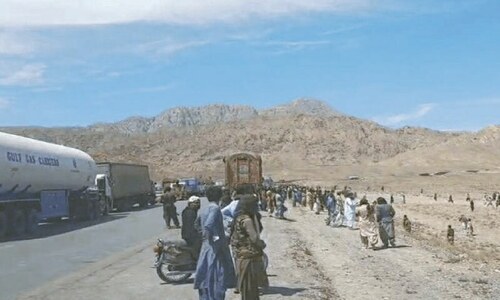Sindh is trying to improve its governance and public service delivery through interactive sessions of provincial cabinet members and senior officials with PPP workers and local council (UC) representatives chaired by the chief minister.
The usual pre-budget consultations with various stakeholders such as trade, industry, and big farmers’ organisations have been extended to the grassroots level.
Efforts are being made to secure local inputs for next year’s budget and development plan, as well as to implement decisions clogged in the bureaucratic web in a timely manner. The need for such a bottom-up approach to resolving problems agitating the people appears to be a response to eroding social cohesion.
The political and social awareness of the PPP workers and UC representatives of various cities and towns was manifested in the range of their demands.
When informed by local councils in one of these events that the transitional period for empowering UCs was still in progress in their areas, Chief Minister Murad Ali Shah directed local bodies secretary to complete the work at once and hand power over to the elected representatives so they could serve their people.
Real transformation lies in taking digitalisation to the grassroots level to build a stronger and more responsive local government structure
The piling up of problems prompted Mr Shah to announce that he would give more funds to UCs if needed and hold them accountable for their judicial spending.
A UC chairman in Karachi pointed out that a Rs500,000 monthly budget was insufficient. Most of the UC chairmen informed Mr Shah that they did not have offices.
In regard to what could make the provincial initiative more effective, it may be relevant to quote Abdullah Khalid, a researcher at the Sustainable Development Policy Institute, on the need for digitalisation: “It is crucial to foster collaboration across government levels and enable the civil society to offer innovative solutions.”
Sindh’s devolution programme is being implemented in phases.
The need for a bottom-up approach to resolving problems agitating the people appears to be a response to eroding social cohesion
For example, the government recently approved the devolution of the Sindh Solid Waste Management Board to a division level by forming separate boards to be run by mayors to oversee garbage management in Karachi, Hyderabad, and Sukkur under a phased programme that includes other cities.
Mr Shah assured PPP workers of his immediate attention to address grievances like water scarcity and infrastructure issues and to uplift the underprivileged without discrimination.
At an interactive session on the FY25 budget held at the Chief Minister’s House in Karachi, the participants drew Mr Shah’s attention towards various civic and developmental problems people face in their respective areas.
Their complaints included a water shortage, poor sanitation, the absence of health and education facilities, dilapidated roads, a shortage of public transport, unemployment, and a drug menace. “Of the 35 villages of Keamari, 30 have no water or electricity,” a UC chairman from district West exclaimed.
The chief minister informed the meeting that a sewerage treatment plant at an estimated cost of Rs135 billion would be initiated in public-private partnership mode for industrial usage of treated wastewater. He was responding to a complaint that the city’s wastewater and industrial waste were being released untreated into the sea damaging mangroves and marine life.
In the Larkana Division, party workers demanded public interest schemes such as universities, hospitals, dual-carriage roads, People Bus Service and more.
So far, more than 70 check dams have been constructed, bringing parched lands under irrigation, the workers said. However, the water issue is still far from solved. In response to the issues raised by local Thari PPP workers, Mr Shah directed the provincial irrigation minister to survey different areas in Tharparkar to identify where check dams could be built to harness rainwater in the rain-dependent arid region.
The party workers also complained that several reverse osmosis plants in Thar had gone out of order. Mr Shah directed the concerned provincial secretary to expedite the repair work under the already initiated umbrella scheme to repair all out-of-order plants.
Owing to prolonged power load-shedding from Naukot to Mithi, the villagers complained they could not provide water to their cattle. The chief minister advised the energy minister to contact Hyderabad Electric Supply Corporation to resolve the issue.
Thari women workers lamented that there was only one girls’ college in Mithi and that the students had to travel long distances daily to reach the college, to which Mr Shah said he would ask the education minister to build a hostel.
The party workers of Mirpurkhas pointed out that the Jamrao and Mithrao canals needed to be lined to save water and control waterlogging. Desilting the Nara Canal was required to improve its water flow and help small growers receive water for their lands.
Citizens also suffer from weak law implementation. In a statement issued on May 19, the Hari Welfare Association described the conditions of women workers and peasants in rural Sindh as ‘precarious’, owing to lapses in enforcing laws to address women and gender inequality.
Real transformation lies in taking digitalisation (supported by legislative and financial empowerment of local bodies) to the grassroots level to build a stronger and more responsive local government structure, wrote Abdullah Khalid in his article, ‘Serving Digitally’ published in Dawn.
“It is about building a future where every citizen feels heard, empowered and actively involved in shaping communities … where local governance is able to serve every citizen,” the writer concludes.
Published in Dawn, The Business and Finance Weekly, May 27th, 2024













































